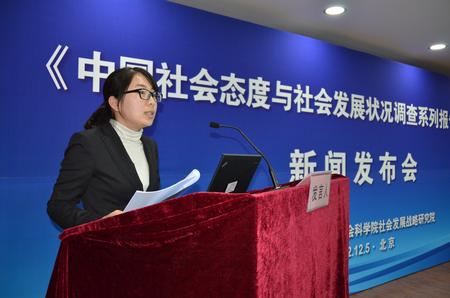 home > > Photo_News
home > > Photo_NewsNISD published China Basic Public Service Survey Report (2012)


On December 5, 2012, NISD published China Basic Public Service Survey Report (2012). Based on the 8070 questionnaires in the national survey of “2012 Chinese Social Attitude and Social Development Situation”, the report analyzes people’s satisfaction (1-5) on and confidence index (0-100) of basic public service, including infrastructure, security, social security, medical service, education and environmental protection. The research found:
1. Generally speaking, people are satisfied with the basic public service and confident with the future. The overall satisfaction score is 3.07 and confidence index is 79.4.
2. The provision of different regions is uneven. The satisfaction score on medical service in eastern region is the highest, 2.96 and the western region is the lowest, 2.85. People in central region are most satisfied and confident with security and social security among the three regions. The western region, with the smallest scale of investment in infrastructure, shows the highest satisfaction score on this aspect (eastern: 3.36; central: 3.35; western: 3.40).
3. The household registration is an important system barrier for getting some basic public services. According to the household registration, agricultural residents and non-agricultural residents have the same level of satisfaction on infrastructure, security and environmental protection. But the latter shows higher satisfaction score in social security, education and medical service than the former.
4. There is group differentiation in basic public service. The elder are more satisfied than the younger. People with higher education degree are less satisfied with infrastructure, education and environmental protection. Employees of CPC offices and government are advantage in social security than other ones. Considering employment situation, the retired people and housewives are the most optimistic groups about the prospect of public service. Besides, the more income and higher social status people have, the more possible they are satisfied with social security and medical service.
Based the above mentioned findings, the report suggests:
1. To adjust the focal point of support to western region. In addition to the infrastructure and education, the medical service should be included.
2. To unify the content the standard of basic public service in urban and rural area.
3. To enhance the social security and employment service of the unemployed and the informal sector.
4. To provide more help on people at the bottom who are disadvantage in education, employment and income.
5. To speedy up the equalization of medical service. The uneven provision of medical service is significant in regional level, system barrier and group differentiation. Therefore, it should be the focus of the future.
Xicheng District, Beijing
Fax: (86 10) 010-68530989







